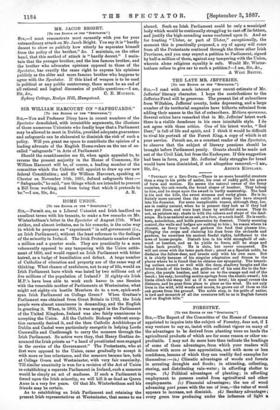THE LATE MR. jEFFERIES.
[To sex Rorros Os me "SrsorAroa."]
Sis„—I read with much interest your recent estimate of Mr. Jefferies' literary character. I hope the contributions to the Jefferies Fund will be generous. The present list of subscribers from Wiltshire, Jefferies' county, looks depressing, and a large number of its territorial magnates have hitherto refrained from adding their names to the list of subscribers. Meliora speramue.. Several critics have remarked that in Mr. Jefferies' latest work there is a visible decadence in his once inimitable style. I do not agree with these critics. One of his latest works, "Red Deer," is fall of life and spirit, and I think it would be difficult to rival his portrait of the Forest King, a copy of which is at your service. Permit me, as a constant reader of the Spectator, to observe that the subject of literary pensions should be brought before Parliament yearly. Grants should be made not out of the Civil List, but from the Exchequer. If this euggestiox had been in force, poor Mr. Jefferiea' daily struggles for bread would have been diminished, if not altogether removed.—I "roSTRArr OF A RED-Dosa.—There is no more beautifal creature than a stag in his pride of antler, his coat of ruddy gold, his grace of form and motion. He seems the natural owner of the ferny coombes, the oak-woods, the broad elopes of heather. They belong to him, and he steps upon the award in lordly mastership. The land is his and the hills, the sweet streams and rocky glens. He is in. finitely more natural than the cattle and sheep that have strayed into his domains. For some inexplicable reason, although they, too, are in reality natural, when he is present they look as if they had been put there, and were kept there by artificial means. They do not, as painters say, shade in with the colours and shape of the land- scape. He is as natural as an oak, era fern, or a rock itself. He is earth- born, autochthon, and holds possession by descent. Utterly scorning control, the walls and hedges are nothing to him ; be roams where ha chooses, as fancy leads, and gathers the food that pleases him. Pillaging the crops and claiming his duos from the orchards and gardens, he exercises his ancient feudal rights, indifferent to the laws of honse.people. Disturb him in his wild stronghold of oak. wood or heather, and as he yields to force, still he stops and looks back proudly. He is slain, but never conquered. He will not cross with the tame park.deer ; proud as a Spanish noble, he disdains the fallow-deer, and breeds only with his OWD race. Bat it is chiefly because of his singular adaptation and fitness to the places where be is found that he obtains our sympathy. The branch- ing antlers accord so well with the deep, shadowy boughs and the broad fronds of the brake, the golden-red of his coat fits to the fox- glove, the purple heather, and later on to the orange and red of the beech ; his easy, bounding motion springs from the elastic sward; his limbs climb the steep hill as if it were level; his speed covers the distance, and he goes from place to place as the wind. He not only lives in the wild, wild woods and moors, he grows out of them as the oak grows from the ground. The noble stag, in his pride of antler, is lord and monarch of all the creatures left to us in English forests and on English hills."


































 Previous page
Previous page